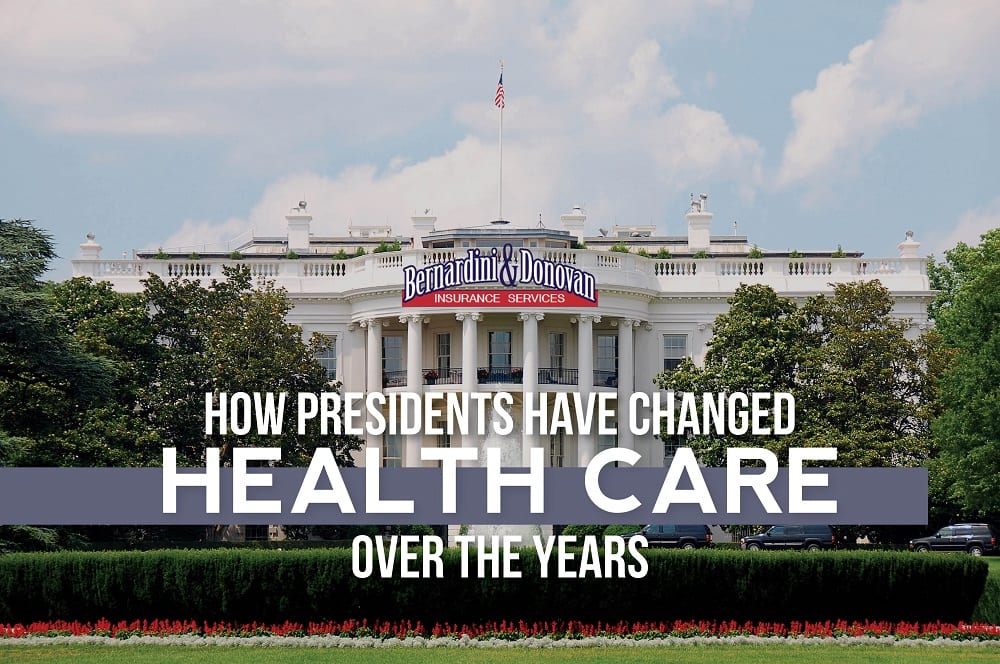With ever-increasing health care costs, insurance is a popular topic for discussion among today’s political leaders. And as the 2020 presidential election quickly approaches, we can anticipate heated debate over the subject in this upcoming year. That’s because, since 1853, presidents have had a significant stake in the matter of health care and insurance. Despite the subject’s complexity, leaders of the 20th and 21st century have fought for reform, new and old ideas, and continue to strive for improving the healthcare system for the American people. So, as we look toward the near future and the potential changes to come, let’s take a look back in history. How has health care and its surrounding policies changed over the years? In this article, we’ll take a look at how past presidents have made changes to our health care and insurance systems over the years.
Meaningful ways past presidents have impacted health care:
- Franklin Pierce, who became president of the United States in 1853, was the first to take action on a healthcare issue when he vetoed Congress’s “Bill for the Benefit of the Indigent Insane.” The bill called for land and resources to be set aside for those in poverty and who were mentally ill. It also covered individuals who were blind and deaf. However, Pierce opposed the bill, arguing that the government should not be involved in social welfare issues.
- In 1901, Theodore Roosevelt became the 26th president and the first to attempt healthcare reform. He proposed the idea for a national healthcare system. However, it was during his failed 1912 reelection.
- The next Roosevelt to take office in 1933 also proved enthusiastic in establishing national health care, though he too was unsuccessful. Franklin Roosevelt, the 32nd US president, fought to include mandatory health insurance in the Social Security Act of 1935. However, with the strong opposition of the American Medical Association, he stopped fighting for the issue for fear that the entire bill would not be passed if this issue was not dropped. Roosevelt also supported the Wagner National Health Act of 1939, which included a national health insurance mandate. This, too, failed to pass, however, without the support of conservative members of Congress.
- The 33rd president, Harry Truman, was in support of national health insurance. However, the Cold War, which spanned his presidency, hindered his efforts for reform. That’s because his proposition of national healthcare was equated with and publicized as soviet-style communism by its opponents.
- Lyndon Johnson took office in 1963 and, during his presidency, made significant changes to the Medicare and Medicaid programs passed in 1965.
- Richard Nixon became the nation’s 36th president in 1969. His presidency extended Medicare when he signed the Social Security Amendments of 1972. This benefited those over 65 years old who were severely disabled or who suffered end-stage disease, making them eligible for Medicare.
- Jimmy Carter, inaugurated in 1977, supported mandatory and universal health insurance that could be issued through the existing system of private insurance. He also proposed the ultimately rejected Hospital Cost Containment Act of 1977 and the Child Health Care Assessment Program.
- Bill Clinton, who took office in 1993, strove to understand the reason for the nation’s rising health care costs and how to solve the growing issue. The result of his ambitions was the Health Security Act. This required employers to provide health insurance to all employees. However, it was not passed by Congress.
- Barack Obama. In our most recent memory is the 44th president’s Patient Protection and Affordable Care Act. This plan aims to cover all Americans with affordable health insurance.
Health care reform is a complicated subject, and making significant changes often spans decades and presidencies. The process is slow, repetitive, and takes no simple solution. So, in this upcoming presidential election season, be sure to know where you stand on this complicated subject.
If you require counsel on the subject of your own health care insurance, do not hesitate to reach out to us at Bernardini and Donovan. We are here to address your questions and concerns as you choose the plan that’s best for you! Call on us today for a healthier 2020.




